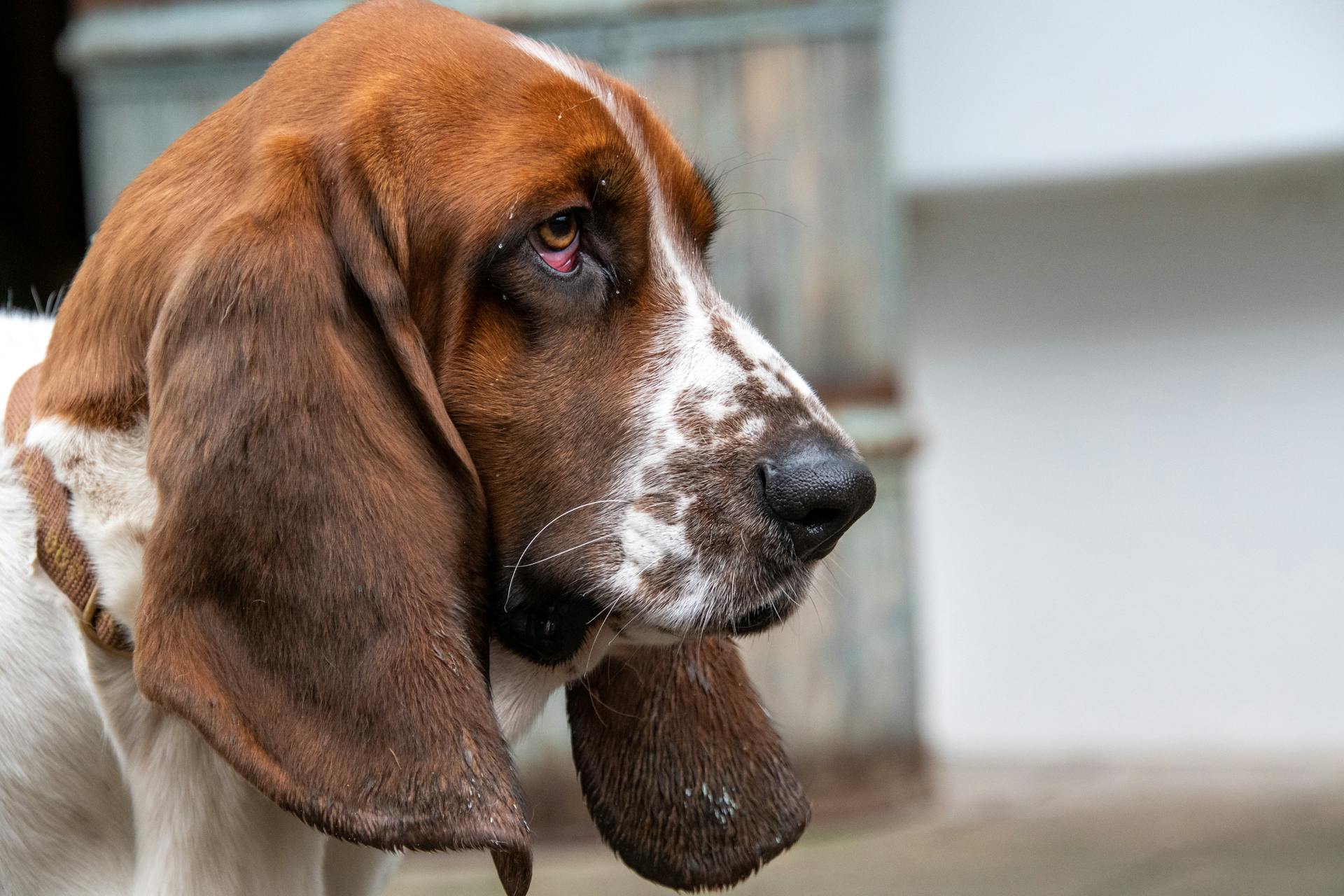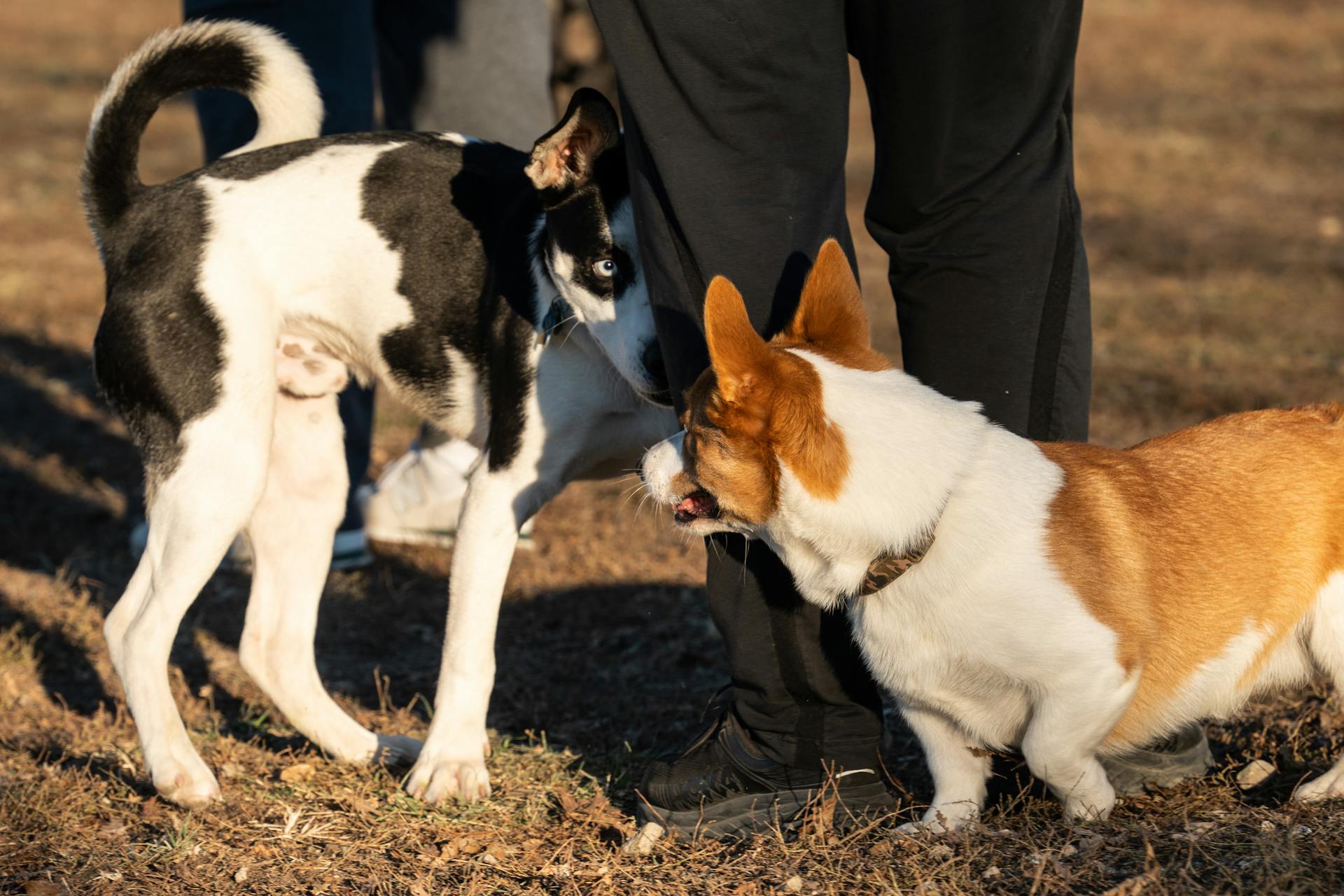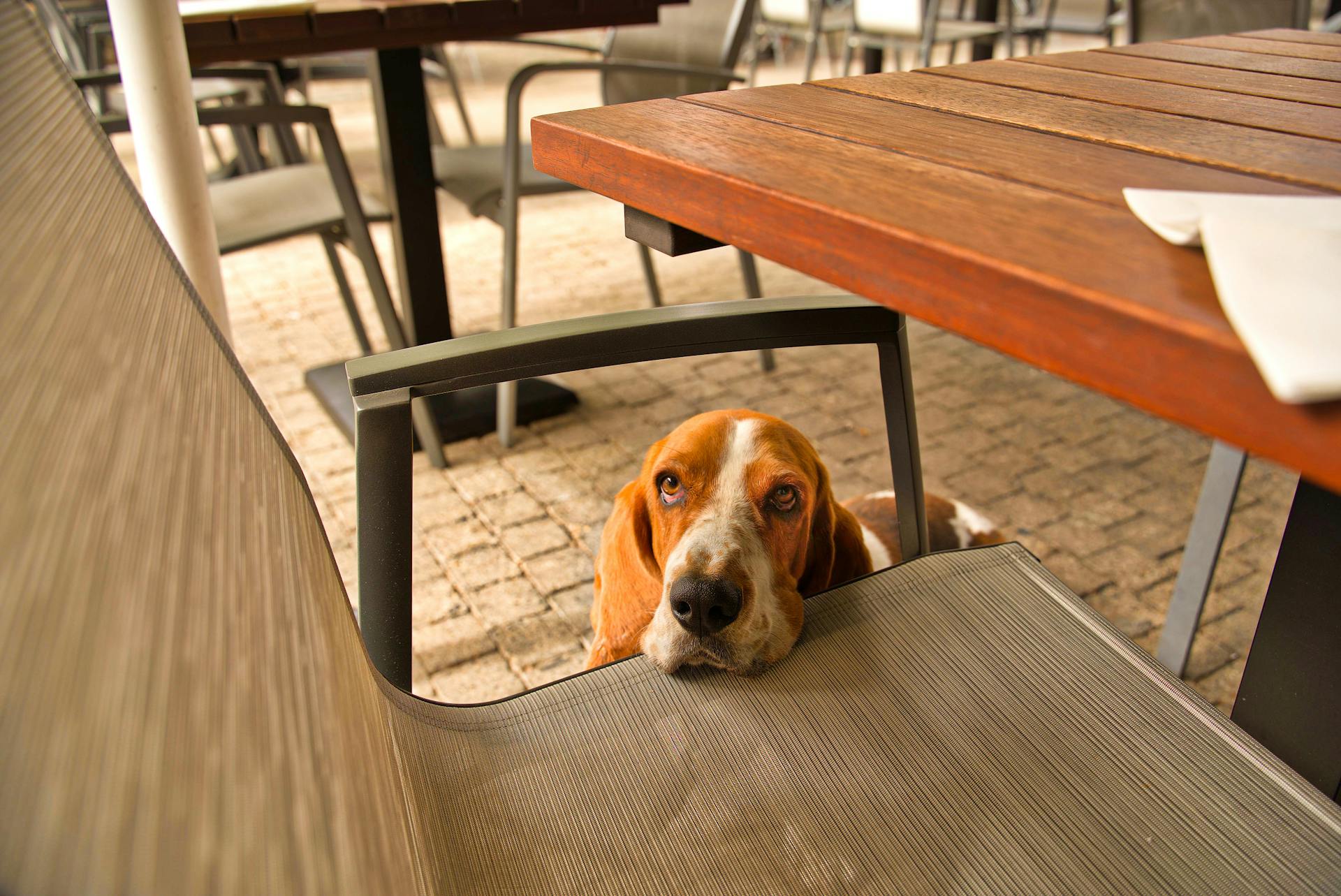
Congratulations on adopting a Basset Hound! These adorable dogs have a unique set of needs that require attention and care. Basset Hounds are prone to obesity, so it's essential to monitor their food intake and ensure they get regular exercise.
Basset Hounds are relatively low-maintenance when it comes to grooming, but they do require regular ear cleaning due to their floppy ears. This can help prevent infections and keep them healthy.
Basset Hounds are known for their calm and gentle nature, making them a great choice for families with children. They are also relatively quiet, which is a bonus for city dwellers.
Care and Health
Basset Hounds are adaptable dogs that can thrive in small houses and apartments, but they do need to live with their family and have access to a yard. They're not suited for extreme temperatures or prolonged outdoor periods.
Basset Hounds need regular exercise to maintain their weight and overall health, but they're not high-energy dogs and can get lazy if they don't get enough physical activity. A leisurely walk with plenty of sniffing time is perfect for them.
To prevent joint strain, it's essential to monitor their weight and avoid overfeeding, as they're prone to obesity. They should also have a ramp or steps to help them navigate stairs, as jumping can be stressful for their front legs and back.
Basset Hounds are independent thinkers and respond well to positive reinforcement training methods, especially with food rewards and praise. Harsh training methods can make them stubborn and less responsive.
Here are some common health issues associated with Basset Hounds:
- Elbow and Hip Dysplasia: a malformation in the joints that can cause severe pain and may require surgery.
- Hypothyroidism: a disease that prevents the body from producing normal levels of hormones, leading to weight gain, lethargy, and skin problems.
- Glaucoma: a painful eye condition that causes pressure to build inside the eye and requires prompt veterinary care.
- Luxating Patella: a condition where the knee pops in and out of place, similar to a "trick knee" in humans.
- Bleeding disorders: diseases that prevent the dog's blood from clotting normally, requiring proactive prevention of injury.
Basset Hounds are prone to ear and skin infections, as well as various eye conditions, so regular assessments are essential to prevent these issues. They also need regular exercise to prevent back problems and obesity.
Grooming and Feeding
Basset Hounds are relatively easy to groom, but they do require some regular attention to keep them clean and healthy. Their short coats make them resistant to dirt and water, but they still need to be brushed weekly to prevent shedding.
To keep your Basset Hound's coat in excellent condition, a thorough rubdown with a bristle brush, coarse cloth, or hound glove is sufficient. They shed throughout the year, but with weekly brushing, shedding should not be a major concern.
In addition to grooming, Basset Hounds need to be fed the right amount of high-quality dog food to maintain their health and weight. The recommended daily portion ranges from 1.5 to 2.5 cups, divided into two meals.
Grooming
Basset Hounds have a short, smooth coat that repels dirt and water, but they still need regular grooming sessions to stay clean and healthy.
Their loose skin and long ears make them prone to ear infections, so it's essential to clean their ears weekly with a pet-safe ear cleaner and a cotton ball. Check for signs of infection like redness, irritation, swelling, unusual odor, or dogs shaking their heads and scratching at their ears.
A weekly brush with a soft brush or shedding tool can help decrease shedding and keep their skin healthy. It's also a great way to bond with your Basset Hound and get them accustomed to grooming routines from an early age.
Regular nail trimming and teeth brushing are also crucial for Basset Hounds. Their large paws can be prone to sores between the toes, so be sure to check them regularly.
Their facial wrinkles need to be cleaned daily with a damp cloth to prevent skin irritation. And don't forget to dry their ears thoroughly after cleaning them to prevent moisture buildup.
A quick brush over once a week is usually all that's required for their short coat, but checking and cleaning the folds of their skin, eyes, and long ears every other day is essential to prevent potential problems.
Curious to learn more? Check out: English Bulldog Skin Rash
Feeding
Feeding your Basset Hound is a crucial aspect of their overall health and well-being. The recommended daily portion ranges from 1.5 to 2.5 cups, divided into two meals.
Each dog is unique, and factors such as size, age, metabolism, and activity level can influence their individual dietary needs. A highly active Basset Hound will require more food than a more sedentary one.
It's essential to measure their food and feed them twice a day, rather than free-feeding, as Bassets have a tendency to overeat and are prone to obesity. To ensure your Basset Hound maintains a healthy weight, observe the eye test and the hands-on test: look for a visible waistline and be able to feel, but not see, his ribs with gentle pressure.
Brushing your Basset Hound's teeth two or three times a week can help prevent tartar buildup and bacteria. Daily brushing is even better for preventing gum disease and bad breath.
Fresh, clean water should be available at all times for your Basset Hound. As with all breeds, treats should be given in moderation to avoid weight gain or obesity-related issues.
To minimize the risk of bloating and stomach problems, feed your Basset Hound smaller, more frequent meals. It's best to talk to your veterinarian to determine a healthy diet and portion plan based on your specific dog's age, weight, and activity level.
Readers also liked: Healthy Bull Terrier
Personality and Temperament
The Basset Hound's personality is a perfect blend of calmness and playfulness. They're known for being friendly and outgoing, making them wonderful family pets.
Their friendly nature extends to children and other pets, but they can be a bit stubborn at times, requiring patient and gentle training. Early socialization is key to ensuring your Basset puppy grows up to be a well-rounded dog.
Their laid-back and relaxed demeanor makes them a perfect companion for a mainly indoor owner, but they still enjoy outdoor time. They're not overly aggressive and generally get along well with strangers, other dogs, and other pets.
Here's a summary of the Basset Hound's personality traits:
They're also known for their distinctive baying bark and howling, which add to their charm and unique personality. With a little love and patience, they can become well-mannered dogs for a dedicated family.
Temperament
Basset Hounds are known for their calm and easygoing nature, making them perfect companions for mainly indoor owners. They are not high-energy dogs and prefer to conserve their energy for more important things, like sniffing out snacks.
Their friendly and outgoing personalities make them wonderful family pets, especially for families with children. They are generally tolerant of kids and other pets, but as with any dog, proper socialization is key.
Basset Hounds are not naturally protective dogs, so they won't make great watchdogs. However, their distinctive baying bark and howling can add to their charm and unique personality.
One thing to keep in mind is that Basset Hounds can be stubborn at times, requiring patient and gentle training. They are highly intelligent, but they tend to use this trait to their own advantage rather than obeying their owners' requests.
Here are some key temperament traits to consider:
Overall, Basset Hounds are gentle, friendly, and loving companions, making them a great addition to many families.
Trainability
Trainability is a crucial aspect of a dog's personality and temperament, and Basset Hounds are no exception. They're considered a highly independent breed, which means training them requires extra time, patience, and consistency.
Basset Hounds are not always easy to train, as they have a strong instinct to follow their own desires. They're bred to hunt on their own, so they can be quite stubborn at times. Basic obedience lessons should begin early, around eight weeks old, and will need to be reinforced several times per day.
To train a Basset Hound, it's essential to use positive reinforcement methods, such as treats and praise. Avoid punishment, as this can make them resist training further. They'll respond well to rewards and encouragement, but may appear aloof and disinterested in following commands.
Here's a summary of Basset Hound trainability:
Overall, Basset Hounds require a gentle and patient approach to training, but with the right techniques and consistency, they can become well-mannered dogs.
Size and Appearance
Basset Hounds are a medium to large-sized breed with a distinctive low-to-the-ground appearance.
They typically weigh between 50 to 65 pounds and stand around 13 to 15 inches in height at the shoulder.
Their short legs and long, heavy-boned body give them a unique and endearing look.
Adult Basset Hounds weigh between 20 and 35 kilograms (44 and 77 lb), which is relatively heavy-boned for their size.
Their loose elastic skin around the neck is known as the dewlap, and it's a characteristic feature of this breed.
The coat is short and comes in a variety of colors, including black, white, and tan tricolor or tan and white bicolor.
Size
Basset Hounds are medium to large-sized dogs, weighing between 50 to 65 pounds.
Their height at the shoulder is around 13 to 15 inches, giving them a distinctive low-to-the-ground appearance.
Despite their relatively heavy weight, Basset Hounds have a sturdy build, making them surprisingly agile and able to move with ease.
Their short legs and long, heavy-boned body contribute to their unique and endearing look.
Their physical traits, including their droopy ears and loose, wrinkled skin, make them easily recognizable and loved by many.
Appearance
Basset Hounds are large dogs, weighing between 44 and 77 pounds.
Their short, sturdy build and long bodies make them a distinctive breed.
Adult Basset Hounds weigh between 20 and 35 kilograms.
The breed's curved sabre tails are held high over their long backs.
The loose elastic skin around the neck is known as the dewlap.
Their face tends to have a sad look due to their hanging skin structure.
The coat is short, with many possible colors including black, white, and tan tricolor or tan and white bicolor.
Family and Social
Basset Hounds make wonderful family dogs as they are kind and patient, but it's essential to teach children not to take advantage of their good nature.
Teaching children the proper way to approach and interact with dogs is crucial, and supervision should always be maintained during their playtime to prevent any unintended rough behavior.
Children should be educated not to disturb a dog while it's sleeping or eating, and they should never attempt to take away the dog's food.
Children and Pets
Having pets in the family can be a wonderful experience for children, but it's essential to teach them how to interact with dogs safely.
Basset Hounds are a great example of a breed that gets along well with children, but it's crucial to supervise their interactions to prevent any rough behavior.
Children should be taught not to take advantage of a dog's good nature, and to respect the dog's personal space.
Dogs and young children should never be left alone together, and adults should always supervise their playtime to ensure everyone's safety.
Teaching children to approach dogs calmly and not to disturb them while they're sleeping or eating is vital for a harmonious household.
Pet Adoption and Purchase
If you're looking to bring a Basset Hound into your family, there are several options to consider. You can start by checking your local shelter and breed-specific rescues for Basset Hounds in need of forever homes.
Basset Hounds can end up in shelters when owners aren't prepared for their specific care needs. These dogs are especially vocal and can be stubborn, so it's essential to talk to other Basset Hound owners and do your research before adopting.
If you plan to adopt from a breeder, it's crucial to find a responsible breeder that provides you with the litter's medical history, introduces you to the parent dogs, and shows you that they're raised in a comfortable, safe indoor location. Basset Hound puppies typically cost between $600 and $1,500 from breeders.
If you're having trouble finding a Basset Hound rescue organization in your area, consider reaching out to the national breed club or a local breed club for guidance. They can direct you to a reputable Basset rescue.
Here are some reputable Basset Hound rescue groups to consider:
- Basset Hound Club of America Rescue
- Basset Hound Club of America Breeders
- AKC Basset Hound Breeders
- Belly Rubs Basset Rescue
- BROOD, Inc. (Basset Rescue of Old Dominion)
- Guardian Angel Basset Rescue, Inc.
- Basset Hound Rescue of So. California
- Suncoast Basset Rescue
- Helping Hands Basset Rescue
- Basset Hound Rescue of Georgia
Frequently Asked Questions
Are basset Hounds high maintenance?
Basset Hounds have relatively low maintenance coats, but require regular skin and ear care to prevent issues. They need daily checks, not just weekly brushing, to stay healthy.
Do basset Hounds bark a lot?
Basset Hounds are known to be frequent barkers, often using their loud, baying-like bark to express excitement or frustration. They may also drool and have a strong odor due to their skin and ear characteristics.
Are basset Hounds cuddly dogs?
Basset Hounds are known for their affectionate nature and love to snuggle with their owners. They thrive on human attention and affection, making them a great choice for those who enjoy cuddly companions.
What two breeds make a Basset Hound?
A Basset Hound is a cross between the Bloodhound and smaller French breeds like the Artesian Normand and the Basset d'Artois. These breeds were combined to create a skilled hunter of small game.
Do basset hounds shed a lot?
Basset Hounds shed constantly, but regular brushing can help manage the shedding. Brushing your Basset Hound once or twice a week may be enough to keep dog hair under control.
Featured Images: pexels.com

